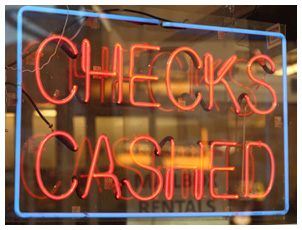 According to press releases from the US Attorney’s Office for the Southern District of Florida in recent weeks, two separate contractors have each been convicted of issuing corporate checks to fictitious companies, cashing those checks at local check cashing stores, and then using the cash to pay their workers “off the books” without collecting and reporting employment taxes and without paying the workers overtime pay.
According to press releases from the US Attorney’s Office for the Southern District of Florida in recent weeks, two separate contractors have each been convicted of issuing corporate checks to fictitious companies, cashing those checks at local check cashing stores, and then using the cash to pay their workers “off the books” without collecting and reporting employment taxes and without paying the workers overtime pay.
Richard Rosaire Routhier owned and operated Drymension Inc in Lake Worth, Florida, offering commercial and residential drywall installation. Over a period of 6 years, Routhier issued corporate checks to several shell companies which were created as a way to avoid paying taxes and which did not actually perform any work for Drymension. He then used the cash to pay his employees without withholding employment taxes or paying overtime pay for weekly hours worked over 40.
Braynert Marquez has a very similar story. Marquez owned and operated two construction companies: Bema Block Corporation and Bema Group Corporation in the greater Miami area, offering general building, masonry and concrete installation. Over a period of 3 years, Marquez issued corporate checks to DJ Construction Group Inc even though DJ Construction was only a shell company created as a way to avoid paying taxes and which did not actually perform any work for the Bema companies. He then used the cash to pay his employees without withholding employment taxes or paying overtime pay for weekly hours worked over 40.
The press release reports:
“In 2007, $698,848.82 in Bema Block and Bema Group checks were written to DJ Construction and cashed to pay employees. Marquez failed to report the cash wages on quarterly employment tax returns and failed to withhold and pay over employment taxes on the wages.”
Marquez took the scheme even further. He paid some of his employees with two checks each pay period: one from the Bema Block Corp from which he withheld employment taxes, and a second check from a different corporation with which he paid the employees as independent contractors and from which no taxes were withheld.
Last month Routhier, who was convicted of “conspiring to defraud the IRS”, was sentenced to 5 years in prison and ordered to pay $1,243,574 in restitution to the IRS.
Marquez faces sentencing in November for his conviction of “aiding and assisting in the preparation and filing of a false employment tax return”.
The press release reports:
“Marquez faces a maximum of three years in prison, a maximum of one year of supervised release and a fine of $250,000. As part of his plea agreement, Marquez agreed that the United States suffered an employment tax loss of at least $200,000 but not more than $400,000 and he agreed to pay restitution to the IRS in the amount of $280,362.”
These are just two examples of a practice which has become all-too-common in the construction industry. Continued efforts by the department of justice may cause these unscrupulous contractors to change their ways or at least think twice before risking prison time.
Same Song, Different Verse: Contractors Cheat using Check Cashing Stores
by Elizabeth McPherson | September 14, 2011



Comments
Facebook Comments
Read comments about this post on Facebook.
Add new comment